Key takeaways:
- Building strong relationships with speakers enhances communication and leads to richer discussions.
- Finding common ground through shared interests and experiences fosters immediate rapport and deeper connections.
- Consistent follow-up and genuine curiosity cultivate trust and openness, allowing for more meaningful conversations.
- Nurturing relationships over time through thoughtful gestures and recognition of milestones strengthens bonds and creates lasting opportunities.
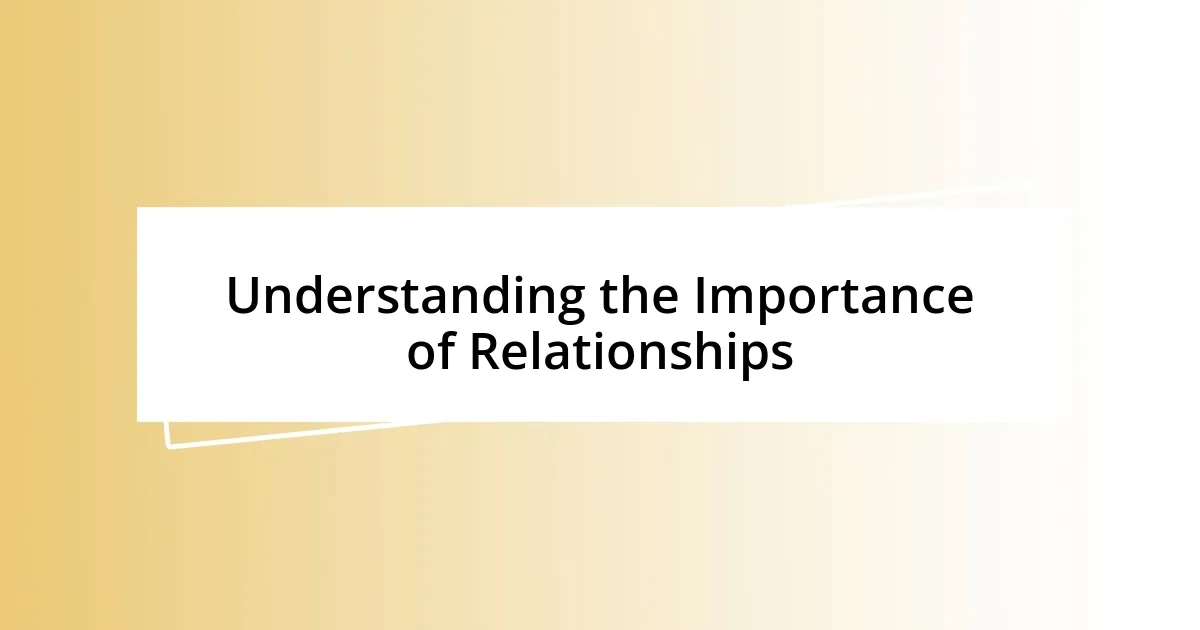
Understanding the Importance of Relationships
Relationships are the bedrock of successful communication, and I’ve learned this lesson through years of connecting with speakers. I recall the time I attended a conference and struck up a conversation with a speaker before their session. That simple exchange not only made the upcoming talk more relatable but also gave me insights into their perspective that I wouldn’t have grasped otherwise. Have you ever felt that connection with someone just before they share their thoughts? It can truly transform your understanding.
Having a strong relationship with speakers fosters an open environment for dialogue. When speakers feel valued and understood, they are more likely to share their authentic selves, which leads to richer discussions. I remember a panel I moderated where my rapport with the speakers encouraged candid conversations. It took the conversation to new heights, making the audience feel like they were participating in something special. Can you think of a time when a little trust opened up a world of insights?
Building these connections requires genuine interest and patience, as it’s essential to invest time in nurturing them. I’ve often found that small gestures, like a follow-up message after an event, can have a profound impact. This simplicity signals that you value their insights and are open to future collaboration. So, what steps can you take today to strengthen your relationships with those you admire in your field?
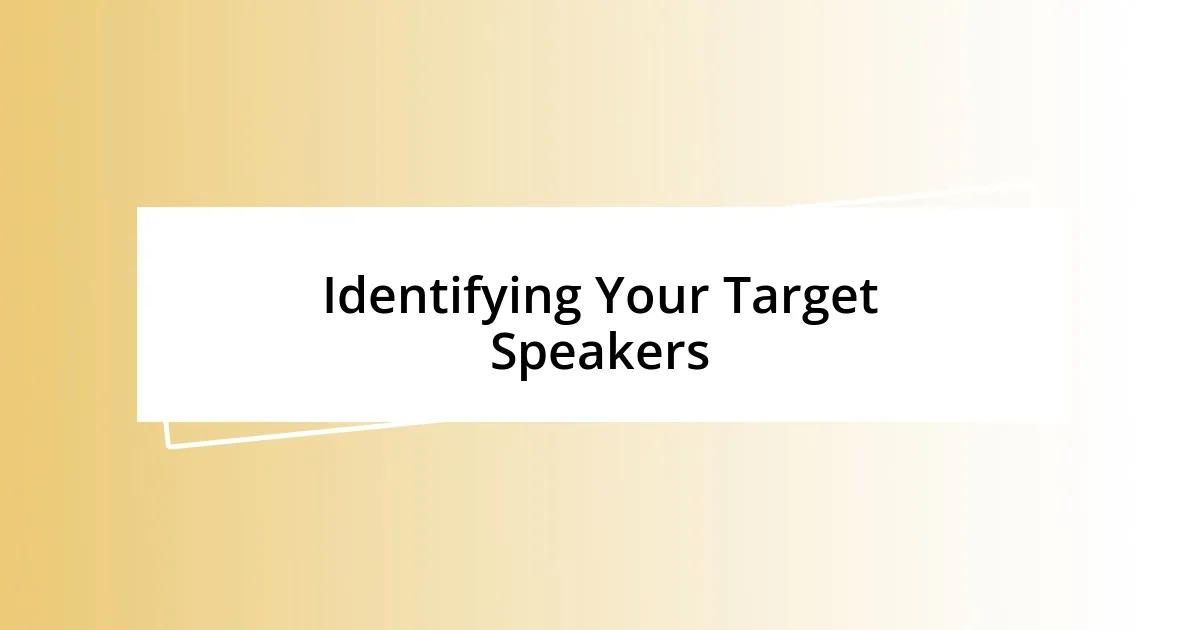
Identifying Your Target Speakers
Identifying your target speakers is crucial, and it involves digging deeper into their backgrounds and areas of expertise. I remember the excitement of searching for speakers who align with my interests. Finding someone who not only understands your field but also brings unique insights can make a world of difference. I often create a checklist to identify who resonates with my goals.
- Define the subject matter or themes that captivate you.
- Research speakers’ previous engagements and content to gauge their style.
- Follow them on social media to understand their insights and audience interactions.
- Consider their alignment with your audience’s interests and needs.
- Look for speakers who are known for engaging storytelling or innovative ideas.
This thoughtful approach helps me build a lineup of speakers I genuinely want to connect with, allowing for better collaboration down the line. Each speaker’s individual perspective adds richness to the conversations I hope to create.
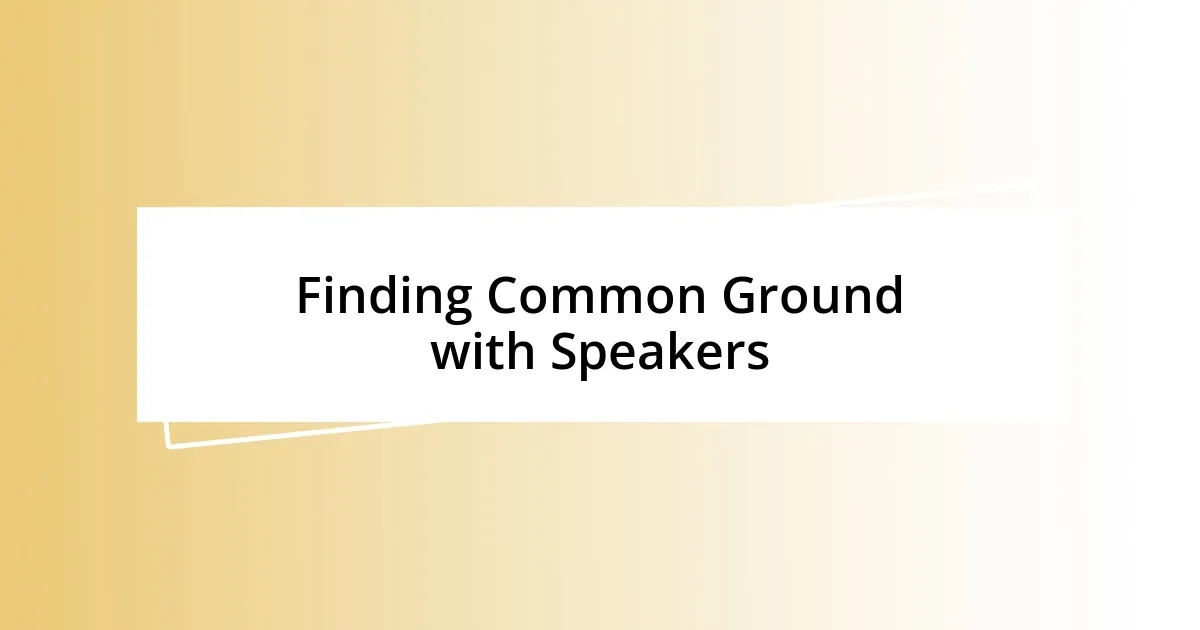
Finding Common Ground with Speakers
Finding common ground is essential in establishing a meaningful connection with speakers. I remember attending a workshop where the speaker mentioned their love for hiking. As an outdoor enthusiast myself, this detail sparked a vibrant discussion that transcended the formal setting. By expressing my own experiences on hiking trails, I found that we both enjoyed the same paths, which naturally warmed up our conversation and set the stage for more in-depth topics. Have you ever realized how shared passions can create immediate rapport?
Additionally, I believe that actively listening plays a pivotal role in identifying common ground. During a networking event, I listened closely while a speaker discussed their journey through a challenging project. I noticed they highlighted teamwork, which resonated deeply with my own values. By acknowledging that similarity and providing an example from my own experiences, I felt a recognizable bond forming. It’s fascinating how these moments of connection can lead to opportunities for collaboration.
Finding shared experiences doesn’t just create friendships; it enhances the overall quality of communication. In one instance, a speaker shared a personal story of setbacks and resilience. I could relate it to my own experiences of overcoming professional hurdles. By sharing this commonality, I not only solidified our rapport but also deepened the authenticity of our interaction. This has led to an ongoing exchange that I continue to cherish.
| Strategy | Description |
|---|---|
| Active Listening | Engaging in conversations that resonate with personal values and experiences to find connective threads. |
| Shared Interests | Identifying hobbies or passions with speakers that can shift the conversation towards more engaging discussions. |
| Authentic Sharing | Sharing personal anecdotes that reflect your journey, creating a deeper emotional connection. |
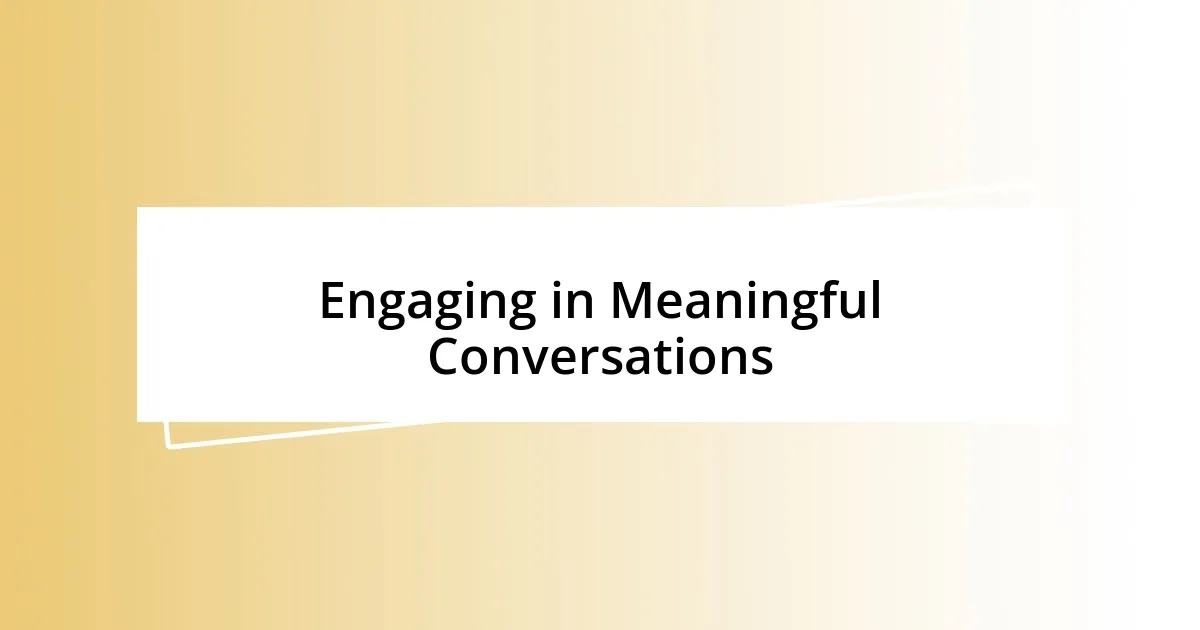
Engaging in Meaningful Conversations
Engaging in meaningful conversations starts with a genuine curiosity about the speaker’s journey. I recall a time when I met a renowned author at a conference. Instead of just talking about their work, I asked them about their writing process and the challenges they faced. The conversation shifted seamlessly from casual pleasantries to an intimate dialogue about vulnerability and inspiration in storytelling. This is where the magic happens—when you delve deeper and show authentic interest, the speaker tends to open up like a book.
It’s also key to create a safe space for these conversations. During a recent chat with a tech innovator, I noticed they seemed hesitant to share their failures. I gently encouraged them by revealing my own setbacks in a past project. This simple act of vulnerability changed the atmosphere instantly; they began to speak more freely, discussing both triumphs and tribulations. Have you experienced how sharing struggles can build bridges of trust? I find this approach creates a much richer dialogue and often leads to enlightening insights.
Finally, I’ve learned that asking open-ended questions can completely transform the trajectory of a discussion. Once, while speaking with a sustainability expert, I posed the question, “What steps do you believe are most critical for future generations?” Their eyes lit up, and suddenly, we were engaged in a passionate conversation about environmental stewardship. It’s fascinating how a well-placed question can spark meaningful dialogue and inspire both speaker and listener. The key takeaway for me has been this: meaningful connections are forged through genuine curiosity and shared stories.
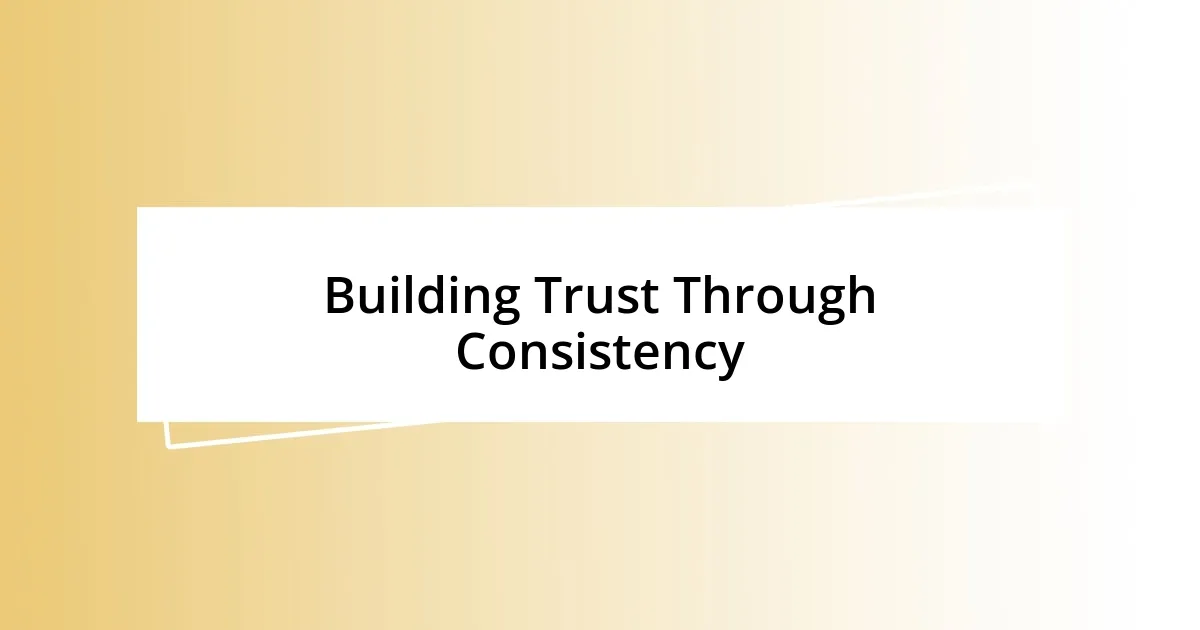
Building Trust Through Consistency
Trust is built through consistent actions and reliable communication. I remember a time when I followed up with a speaker months after our initial meeting. I had taken notes on a few of their projects and sent them an email sharing my thoughts and a relevant article I found. The response was heartwarming; they appreciated my interest and remembered our previous chat. This continuity isn’t just about staying in touch; it shows that I genuinely care about our relationship.
When I consistently show up for speakers—whether it’s attending their events or sharing their work on social media—it reinforces my commitment to the connection. For instance, I once made it a point to engage with a speaker after every session they led at a conference. One day, they even mentioned how my support made a difference for them. It’s these small, consistent gestures of presence that erect sturdy trust bridges between us.
I often think about how much vulnerability is required in relationships. Trust takes time, and my consistent efforts have typically led to deeper conversations. For example, I tracked the progress of a speaker’s initiative over several months, checking in periodically. When we finally spoke again, they shared more openly about the challenges they faced—something they hadn’t done before. It’s incredible how consistency can cultivate an environment that encourages such honesty. How has your approach to nurturing relationships evolved over time?
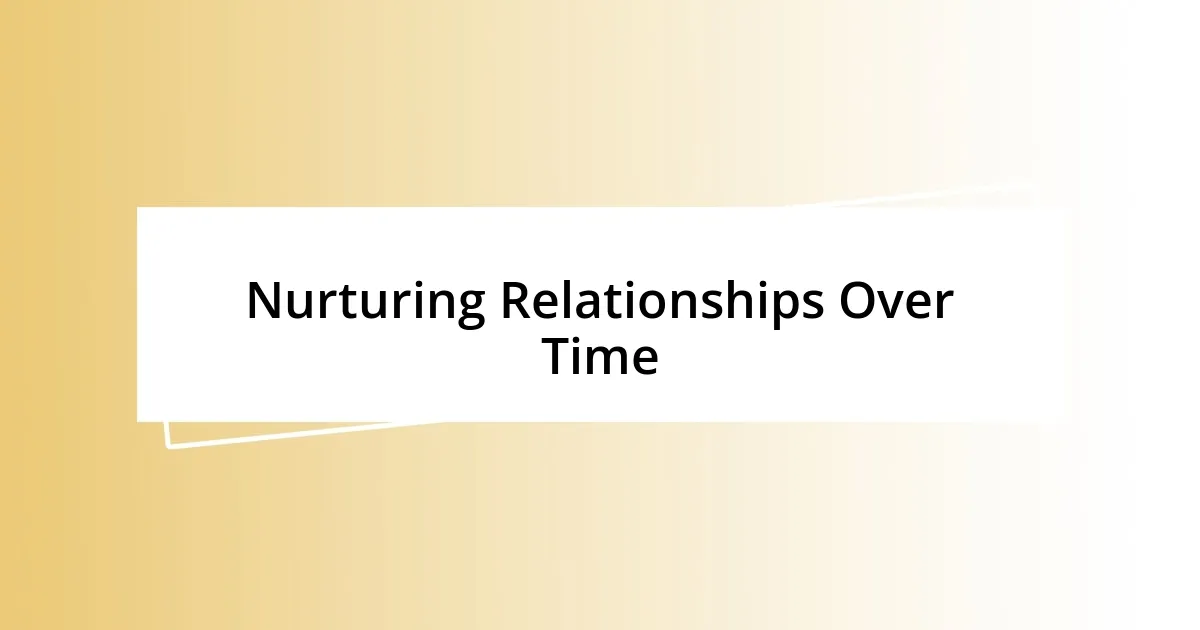
Nurturing Relationships Over Time
Nurturing relationships requires patience and intentionality. I remember a time when I sent a postcard to a public speaker I admired after attending their workshop. It wasn’t just a thank-you note; I wrote about how their insights had impacted my own journey. To my surprise, they replied, sharing their thoughts on creativity and personal growth. This exchange felt like planting a seed, one that would flourish with care over time.
I’ve found that sending occasional check-ins or sharing relevant articles keeps the connection alive. Just last month, I stumbled upon a piece about one speaker’s topic of interest and immediately forwarded it to them with a simple message. The quick reply I received felt rewarding; they appreciated my thoughtfulness and asked to discuss it further. Each interaction like this demonstrates that nurturing relationships is not a one-time effort, but a continual process that deepens bonds.
Sometimes, I realize the importance of celebrating milestones together. I’ve made it a point to remember birthdays or significant achievements in a speaker’s career. I once surprised a speaker with a small gift on their book launch, which sparked a delightful conversation. That moment brought our relationship to a new level of camaraderie. It’s essential to ask yourself: how do you celebrate the connections you value? Acknowledging these moments can elevate the relationship and create lasting memories that endure over time.
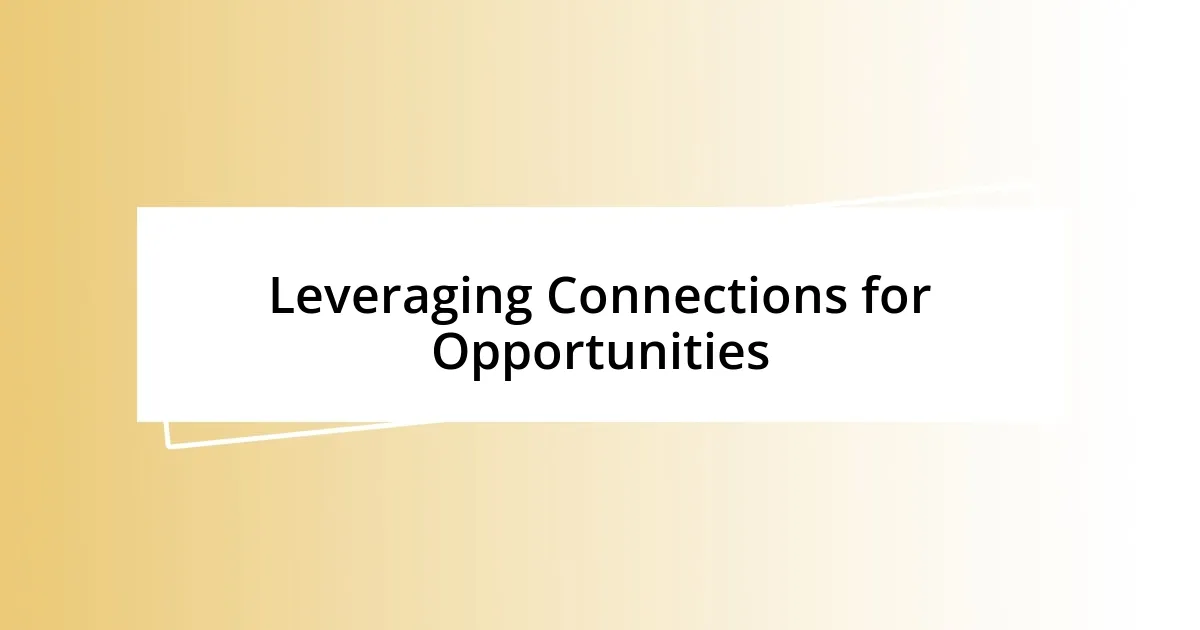
Leveraging Connections for Opportunities
Leveraging connections can truly open doors to new opportunities. I recall a time when I reached out to a speaker after their presentation about innovative leadership. I expressed my admiration and shared how their approach inspired my own work. To my surprise, they invited me to collaborate on a panel discussion about leadership strategies. It reminded me of how one simple message can lead to unexpected paths.
Networking isn’t just about exchanging business cards; it’s about fostering genuine connections that can lead to valuable opportunities. I learned this firsthand when I attended a networking event and made an effort to connect with a thought leader in my field. Our conversation sparked ideas for a joint workshop, which not only expanded our reach but also built a stronger bond based on our shared interests. Have you ever experienced a moment where a casual conversation blossomed into something more significant?
I find it intriguing how the relationships we cultivate can create a ripple effect. A few months ago, I mentioned a speaker’s work in a social media post, tagging them for their contributions. That led to our first collaborative project, which turned out to be more rewarding than either of us anticipated. It’s fascinating to consider: how do our connections intertwine, creating a web of opportunities waiting to be explored? Each interaction holds the potential for something greater, if only we take the time to nurture it.












